人教版(2019)高中英语必修三Unit 2-Morals and virtues语法探索+写作指导学案
文档属性
| 名称 | 人教版(2019)高中英语必修三Unit 2-Morals and virtues语法探索+写作指导学案 |
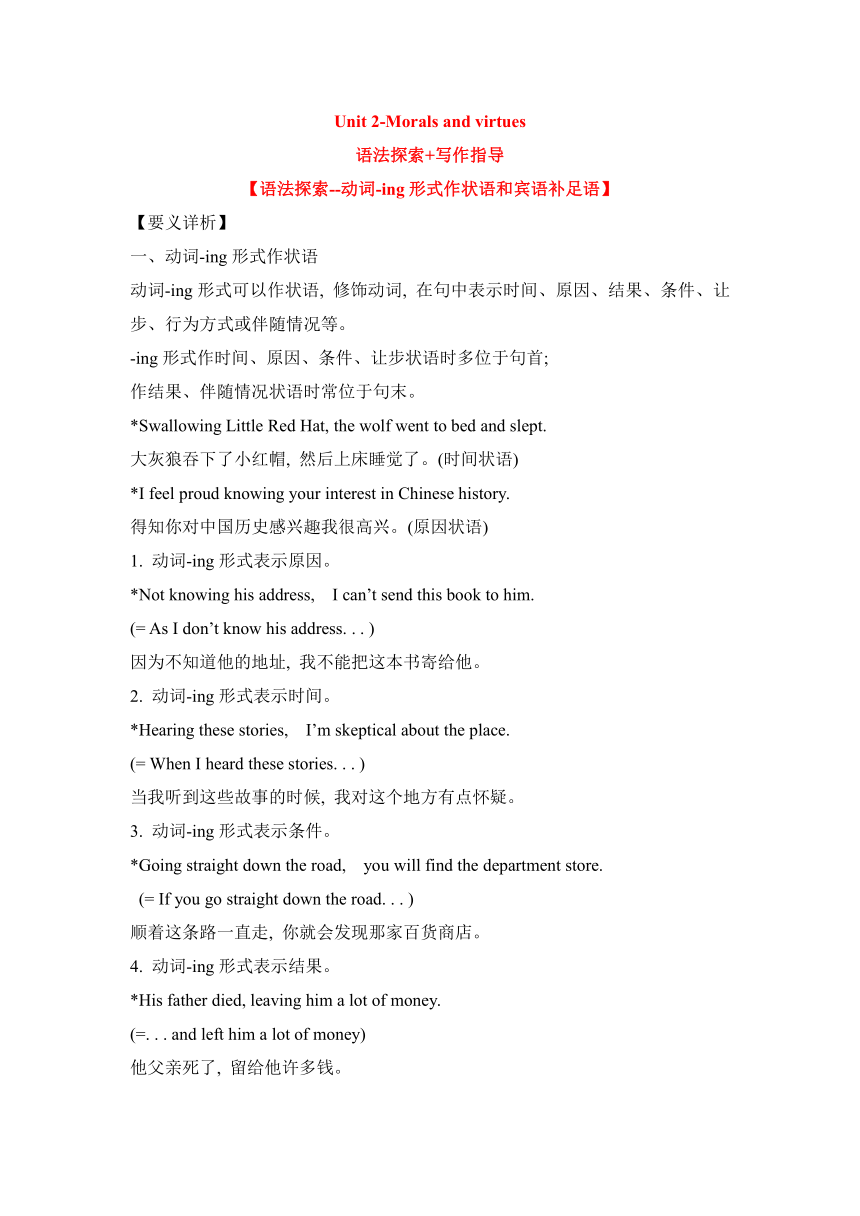
|
|
| 格式 | doc | ||
| 文件大小 | 134.0KB | ||
| 资源类型 | 教案 | ||
| 版本资源 | 人教版(2019) | ||
| 科目 | 英语 | ||
| 更新时间 | 2021-06-04 00:00:00 | ||
图片预览

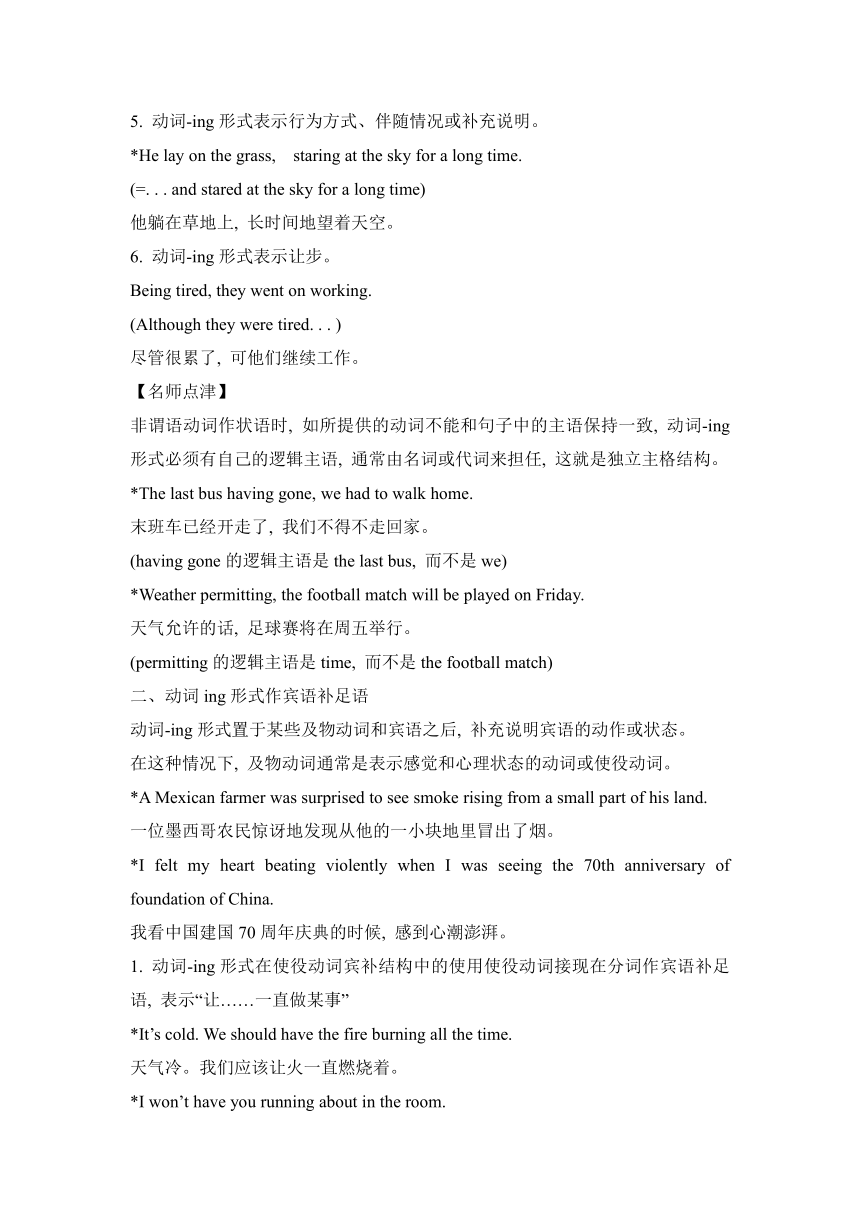
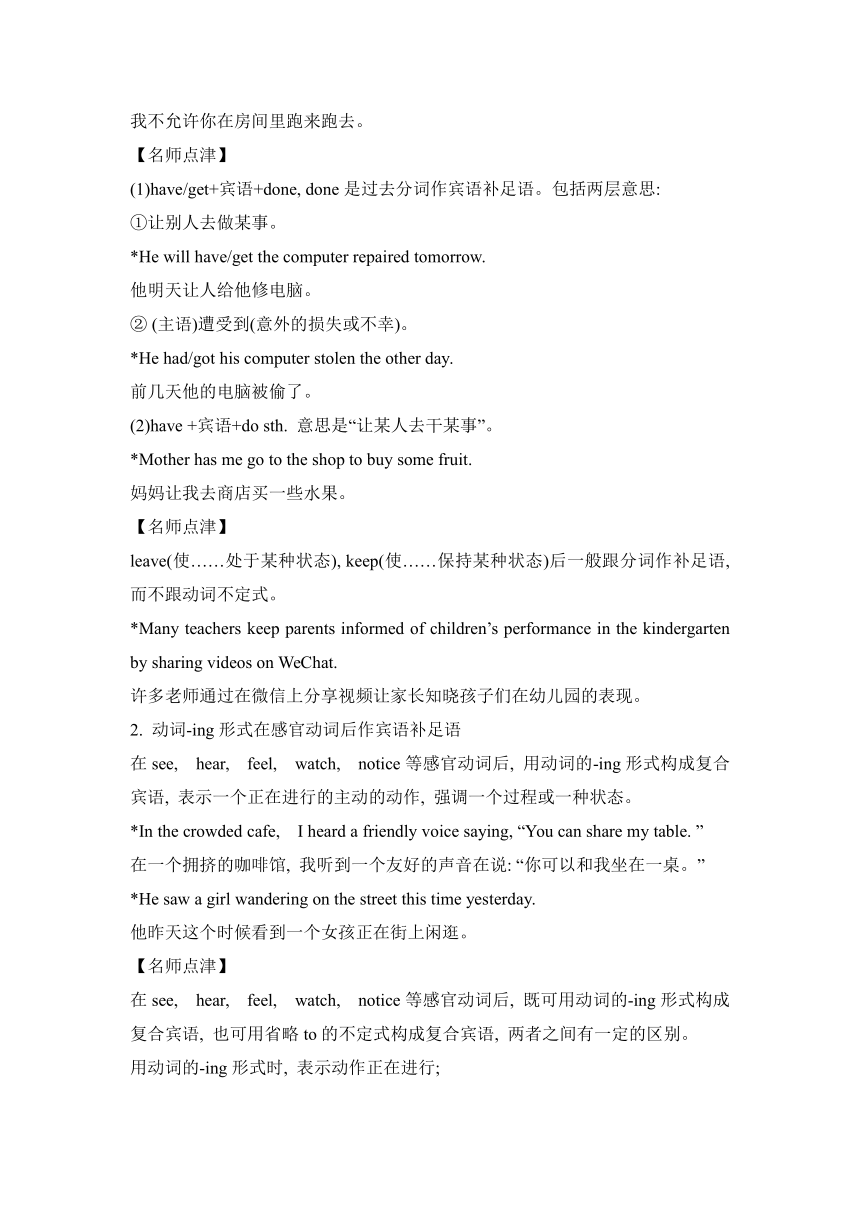
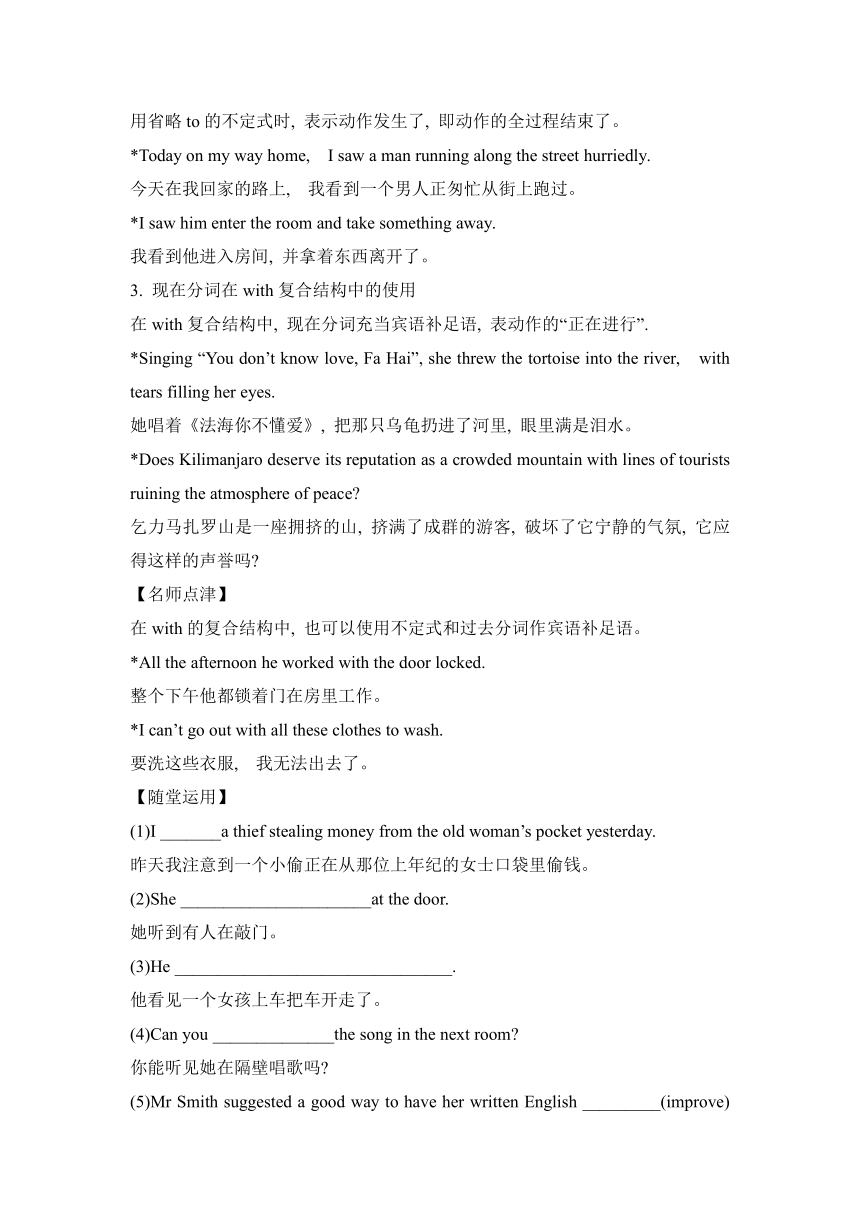
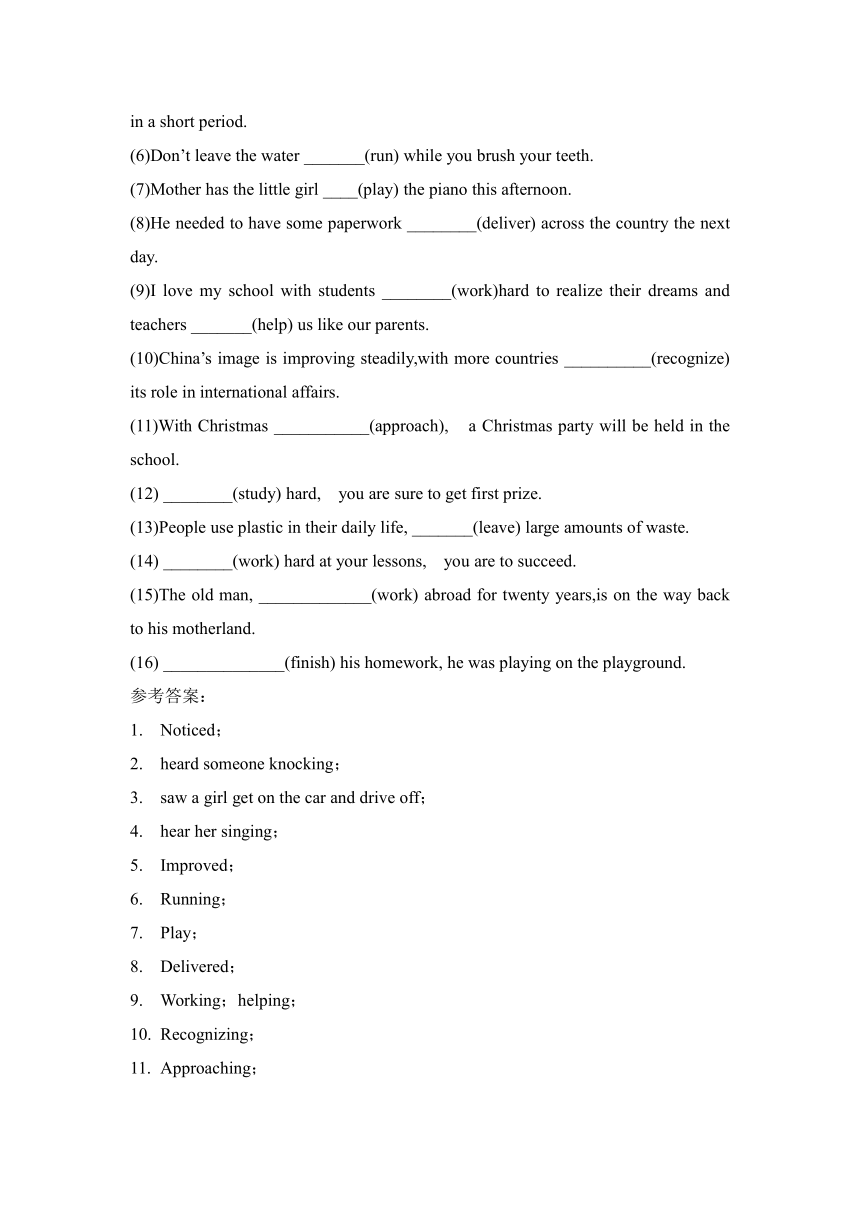
文档简介
Unit 2-Morals and virtues
语法探索+写作指导
【语法探索--动词-ing形式作状语和宾语补足语】
【要义详析】
一、动词-ing形式作状语
动词-ing形式可以作状语, 修饰动词, 在句中表示时间、原因、结果、条件、让步、行为方式或伴随情况等。
-ing形式作时间、原因、条件、让步状语时多位于句首;
作结果、伴随情况状语时常位于句末。
*Swallowing Little Red Hat, the wolf went to bed and slept.
大灰狼吞下了小红帽, 然后上床睡觉了。(时间状语)
*I feel proud knowing your interest in Chinese history.
得知你对中国历史感兴趣我很高兴。(原因状语)
1. 动词-ing形式表示原因。
*Not knowing his address, I can’t send this book to him.
(= As I don’t know his address. . . )
因为不知道他的地址, 我不能把这本书寄给他。
2. 动词-ing形式表示时间。
*Hearing these stories, I’m skeptical about the place.
(= When I heard these stories. . . )
当我听到这些故事的时候, 我对这个地方有点怀疑。
3. 动词-ing形式表示条件。
*Going straight down the road, you will find the department store.
(= If you go straight down the road. . . )
顺着这条路一直走, 你就会发现那家百货商店。
4. 动词-ing形式表示结果。
*His father died, leaving him a lot of money.
(=. . . and left him a lot of money)
他父亲死了, 留给他许多钱。
5. 动词-ing形式表示行为方式、伴随情况或补充说明。
*He lay on the grass, staring at the sky for a long time.
(=. . . and stared at the sky for a long time)
他躺在草地上, 长时间地望着天空。
6. 动词-ing形式表示让步。
Being tired, they went on working.
(Although they were tired. . . )
尽管很累了, 可他们继续工作。
【名师点津】
非谓语动词作状语时, 如所提供的动词不能和句子中的主语保持一致, 动词-ing形式必须有自己的逻辑主语, 通常由名词或代词来担任, 这就是独立主格结构。
*The last bus having gone, we had to walk home.
末班车已经开走了, 我们不得不走回家。
(having gone的逻辑主语是the last bus, 而不是we)
*Weather permitting, the football match will be played on Friday.
天气允许的话, 足球赛将在周五举行。
(permitting的逻辑主语是time, 而不是the football match)
二、动词ing形式作宾语补足语
动词-ing形式置于某些及物动词和宾语之后, 补充说明宾语的动作或状态。
在这种情况下, 及物动词通常是表示感觉和心理状态的动词或使役动词。
*A Mexican farmer was surprised to see smoke rising from a small part of his land.
一位墨西哥农民惊讶地发现从他的一小块地里冒出了烟。
*I felt my heart beating violently when I was seeing the 70th anniversary of foundation of China.
我看中国建国70周年庆典的时候, 感到心潮澎湃。
1. 动词-ing形式在使役动词宾补结构中的使用使役动词接现在分词作宾语补足语, 表示“让……一直做某事”
*It’s cold. We should have the fire burning all the time.
天气冷。我们应该让火一直燃烧着。
*I won’t have you running about in the room.
我不允许你在房间里跑来跑去。
【名师点津】
(1)have/get+宾语+done, done是过去分词作宾语补足语。包括两层意思:
①让别人去做某事。
*He will have/get the computer repaired tomorrow.
他明天让人给他修电脑。
② (主语)遭受到(意外的损失或不幸)。
*He had/got his computer stolen the other day.
前几天他的电脑被偷了。
(2)have +宾语+do sth. 意思是“让某人去干某事”。
*Mother has me go to the shop to buy some fruit.
妈妈让我去商店买一些水果。
【名师点津】
leave(使……处于某种状态), keep(使……保持某种状态)后一般跟分词作补足语, 而不跟动词不定式。
*Many teachers keep parents informed of children’s performance in the kindergarten by sharing videos on WeChat.
许多老师通过在微信上分享视频让家长知晓孩子们在幼儿园的表现。
2. 动词-ing形式在感官动词后作宾语补足语
在see, hear, feel, watch, notice等感官动词后, 用动词的-ing形式构成复合宾语, 表示一个正在进行的主动的动作, 强调一个过程或一种状态。
*In the crowded cafe, I heard a friendly voice saying, “You can share my table. ”
在一个拥挤的咖啡馆, 我听到一个友好的声音在说: “你可以和我坐在一桌。”
*He saw a girl wandering on the street this time yesterday.
他昨天这个时候看到一个女孩正在街上闲逛。
【名师点津】
在see, hear, feel, watch, notice等感官动词后, 既可用动词的-ing形式构成复合宾语, 也可用省略to的不定式构成复合宾语, 两者之间有一定的区别。
用动词的-ing形式时, 表示动作正在进行;
用省略to的不定式时, 表示动作发生了, 即动作的全过程结束了。
*Today on my way home, I saw a man running along the street hurriedly.
今天在我回家的路上, 我看到一个男人正匆忙从街上跑过。
*I saw him enter the room and take something away.
我看到他进入房间, 并拿着东西离开了。
3. 现在分词在with复合结构中的使用
在with复合结构中, 现在分词充当宾语补足语, 表动作的“正在进行”.
*Singing “You don’t know love, Fa Hai”, she threw the tortoise into the river, with tears filling her eyes.
她唱着《法海你不懂爱》, 把那只乌龟扔进了河里, 眼里满是泪水。
*Does Kilimanjaro deserve its reputation as a crowded mountain with lines of tourists ruining the atmosphere of peace?
乞力马扎罗山是一座拥挤的山, 挤满了成群的游客, 破坏了它宁静的气氛, 它应得这样的声誉吗?
【名师点津】
在with的复合结构中, 也可以使用不定式和过去分词作宾语补足语。
*All the afternoon he worked with the door locked.
整个下午他都锁着门在房里工作。
*I can’t go out with all these clothes to wash.
要洗这些衣服, 我无法出去了。
【随堂运用】
(1)I _______a thief stealing money from the old woman’s pocket yesterday.
昨天我注意到一个小偷正在从那位上年纪的女士口袋里偷钱。
(2)She ______________________at the door. ?
她听到有人在敲门。
(3)He ________________________________. ?
他看见一个女孩上车把车开走了。
(4)Can you ______________the song in the next room? ?
你能听见她在隔壁唱歌吗?
(5)Mr Smith suggested a good way to have her written English _________(improve) in a short period.
(6)Don’t leave the water _______(run) while you brush your teeth.
(7)Mother has the little girl ____(play) the piano this afternoon.
(8)He needed to have some paperwork ________(deliver) across the country the next day.
(9)I love my school with students ________(work)hard to realize their dreams and teachers _______(help) us like our parents. ?
(10)China’s image is improving steadily,with more countries __________(recognize) its role in international affairs.
(11)With Christmas ___________(approach), a Christmas party will be held in the school.
(12) ________(study) hard, you are sure to get first prize.
(13)People use plastic in their daily life, _______(leave) large amounts of waste.
(14) ________(work) hard at your lessons, you are to succeed.
(15)The old man, _____________(work) abroad for twenty years,is on the way back to his motherland. ?
(16) ______________(finish) his homework, he was playing on the playground. ?
参考答案:
Noticed;
heard someone knocking;
saw a girl get on the car and drive off;
hear her singing;
Improved;
Running;
Play;
Delivered;
Working;helping;
Recognizing;
Approaching;
Studying;
Leaving;
Working;
having worked;
Having finished
【写作指导--如何写评论】
【文体剖析】
书评、影评或文章评论是一种议论文体。
这类文体主要包含两个部分:
第一部分是先叙述文章(电影, 书籍)大概的内容;
第二部分再写其优缺点和你的感受或启示。
根据字数还可以适当引用其他人的评价, 再抒发自己的见解(同意或不同意+理由)。
【话题词汇】
1. passage 文章
2. comment 评价
3. recommend 推荐
4. highlight 亮点
5. theme 主题
6. lesson 教训
7. principle 道理, 原则
8. be recognised 被认可
9. learn from 从……中学到
【话题句式】
1. What we can learn from it is that we should be kind and willing to help others.
从中我们可以学到的是我们应该有善心, 并乐于助人。
2. It is known to us all that this novel has a great influence on the development of Chinese literature.
众所周知, 这部小说对中国文学的发展有着积极的影响。
3. It is recognised that kindness and diligence are both traditional virtues of Chinese people.
公认的是, 善良和勤劳是中国人民的传统美德。
4. It tells us a principle that we should strengthen people’s awareness of social responsibility.
它告诉我们一个道理: 我们应该增强人们的社会责任意识。
5. I strongly hope that you can have a try and it won’t disappoint you.
我强烈希望你能试一试(读一读), 它不会让你失望。
【典题演练】
假设你是李华, 你打算向你的外国朋友Eric推荐一部最近刚刚看过的中文电影《流浪地球》。
要点如下:
1. 观影时间和地点;
2. 电影亮点(科幻电影、保护地球……);
3. 推荐观影。
注意:
1. 词数80左右
2. 可适当增加细节, 以使行文连贯。
参考词汇:
科幻电影 science fiction film
流浪地球 The Wandering Earth
【谋篇】
【遣词】
1. ___________推荐
2. ______ 主题
3. ________ 共同的
4. __________ 使……失望
5. _____________ 被认为是……?
6. ________________对……印象深刻?
7. _____________ 不遗余力?
8. _________ 尝试一下?
Recommend;
Theme;
Common;
Disappoint;
be regarded as;
be impressed with;
Spare no effort;
Have a try
【造句】
1. 完成句子
(1)我上周末在本地剧院看了这部电影。
(2)这部电影被认为是中国电影史上最好的科幻片。
(3)这部电影的主题给我留下了深刻印象。
(4)这部电影的主题是关于保护地球。
(5)我们应该不遗余力保护它。
(6)我强烈希望你看看这部电影, 它不会让你失望。
2. 句式升级
(7)用非限制性定语从句提升(1)、(2)
(8)用限制性定语从句提升(3)、(4)
I saw the film at the local theatre last weekend.
The film is regarded as the best science fiction film in Chinese film history.
I was deeply impressed with the film’s theme.
The film’s theme is about protecting the earth.
We should spare no effort to protect it.
I strongly hope you can have a try and the film will never disappoint you!
I saw the film at the local theatre last weekend,which is regarded as the best science fiction film in Chinese film history.
And I was deeply impressed with the film’s theme which is about protecting the earth.
【成篇】
Dear Eric,
How’s everything going? I’m writing to recommend a film The Wandering Earth to you.
I saw the film at the local theatre last weekend, which is regarded as the best science fiction film in Chinese film history. And I was deeply impressed with the film’s theme which is about protecting the earth. The earth is our common home and we should spare no effort to protect it.
I strongly hope you can have a try and the film will never disappoint you!
Yours,
Li Hua
语法探索+写作指导
【语法探索--动词-ing形式作状语和宾语补足语】
【要义详析】
一、动词-ing形式作状语
动词-ing形式可以作状语, 修饰动词, 在句中表示时间、原因、结果、条件、让步、行为方式或伴随情况等。
-ing形式作时间、原因、条件、让步状语时多位于句首;
作结果、伴随情况状语时常位于句末。
*Swallowing Little Red Hat, the wolf went to bed and slept.
大灰狼吞下了小红帽, 然后上床睡觉了。(时间状语)
*I feel proud knowing your interest in Chinese history.
得知你对中国历史感兴趣我很高兴。(原因状语)
1. 动词-ing形式表示原因。
*Not knowing his address, I can’t send this book to him.
(= As I don’t know his address. . . )
因为不知道他的地址, 我不能把这本书寄给他。
2. 动词-ing形式表示时间。
*Hearing these stories, I’m skeptical about the place.
(= When I heard these stories. . . )
当我听到这些故事的时候, 我对这个地方有点怀疑。
3. 动词-ing形式表示条件。
*Going straight down the road, you will find the department store.
(= If you go straight down the road. . . )
顺着这条路一直走, 你就会发现那家百货商店。
4. 动词-ing形式表示结果。
*His father died, leaving him a lot of money.
(=. . . and left him a lot of money)
他父亲死了, 留给他许多钱。
5. 动词-ing形式表示行为方式、伴随情况或补充说明。
*He lay on the grass, staring at the sky for a long time.
(=. . . and stared at the sky for a long time)
他躺在草地上, 长时间地望着天空。
6. 动词-ing形式表示让步。
Being tired, they went on working.
(Although they were tired. . . )
尽管很累了, 可他们继续工作。
【名师点津】
非谓语动词作状语时, 如所提供的动词不能和句子中的主语保持一致, 动词-ing形式必须有自己的逻辑主语, 通常由名词或代词来担任, 这就是独立主格结构。
*The last bus having gone, we had to walk home.
末班车已经开走了, 我们不得不走回家。
(having gone的逻辑主语是the last bus, 而不是we)
*Weather permitting, the football match will be played on Friday.
天气允许的话, 足球赛将在周五举行。
(permitting的逻辑主语是time, 而不是the football match)
二、动词ing形式作宾语补足语
动词-ing形式置于某些及物动词和宾语之后, 补充说明宾语的动作或状态。
在这种情况下, 及物动词通常是表示感觉和心理状态的动词或使役动词。
*A Mexican farmer was surprised to see smoke rising from a small part of his land.
一位墨西哥农民惊讶地发现从他的一小块地里冒出了烟。
*I felt my heart beating violently when I was seeing the 70th anniversary of foundation of China.
我看中国建国70周年庆典的时候, 感到心潮澎湃。
1. 动词-ing形式在使役动词宾补结构中的使用使役动词接现在分词作宾语补足语, 表示“让……一直做某事”
*It’s cold. We should have the fire burning all the time.
天气冷。我们应该让火一直燃烧着。
*I won’t have you running about in the room.
我不允许你在房间里跑来跑去。
【名师点津】
(1)have/get+宾语+done, done是过去分词作宾语补足语。包括两层意思:
①让别人去做某事。
*He will have/get the computer repaired tomorrow.
他明天让人给他修电脑。
② (主语)遭受到(意外的损失或不幸)。
*He had/got his computer stolen the other day.
前几天他的电脑被偷了。
(2)have +宾语+do sth. 意思是“让某人去干某事”。
*Mother has me go to the shop to buy some fruit.
妈妈让我去商店买一些水果。
【名师点津】
leave(使……处于某种状态), keep(使……保持某种状态)后一般跟分词作补足语, 而不跟动词不定式。
*Many teachers keep parents informed of children’s performance in the kindergarten by sharing videos on WeChat.
许多老师通过在微信上分享视频让家长知晓孩子们在幼儿园的表现。
2. 动词-ing形式在感官动词后作宾语补足语
在see, hear, feel, watch, notice等感官动词后, 用动词的-ing形式构成复合宾语, 表示一个正在进行的主动的动作, 强调一个过程或一种状态。
*In the crowded cafe, I heard a friendly voice saying, “You can share my table. ”
在一个拥挤的咖啡馆, 我听到一个友好的声音在说: “你可以和我坐在一桌。”
*He saw a girl wandering on the street this time yesterday.
他昨天这个时候看到一个女孩正在街上闲逛。
【名师点津】
在see, hear, feel, watch, notice等感官动词后, 既可用动词的-ing形式构成复合宾语, 也可用省略to的不定式构成复合宾语, 两者之间有一定的区别。
用动词的-ing形式时, 表示动作正在进行;
用省略to的不定式时, 表示动作发生了, 即动作的全过程结束了。
*Today on my way home, I saw a man running along the street hurriedly.
今天在我回家的路上, 我看到一个男人正匆忙从街上跑过。
*I saw him enter the room and take something away.
我看到他进入房间, 并拿着东西离开了。
3. 现在分词在with复合结构中的使用
在with复合结构中, 现在分词充当宾语补足语, 表动作的“正在进行”.
*Singing “You don’t know love, Fa Hai”, she threw the tortoise into the river, with tears filling her eyes.
她唱着《法海你不懂爱》, 把那只乌龟扔进了河里, 眼里满是泪水。
*Does Kilimanjaro deserve its reputation as a crowded mountain with lines of tourists ruining the atmosphere of peace?
乞力马扎罗山是一座拥挤的山, 挤满了成群的游客, 破坏了它宁静的气氛, 它应得这样的声誉吗?
【名师点津】
在with的复合结构中, 也可以使用不定式和过去分词作宾语补足语。
*All the afternoon he worked with the door locked.
整个下午他都锁着门在房里工作。
*I can’t go out with all these clothes to wash.
要洗这些衣服, 我无法出去了。
【随堂运用】
(1)I _______a thief stealing money from the old woman’s pocket yesterday.
昨天我注意到一个小偷正在从那位上年纪的女士口袋里偷钱。
(2)She ______________________at the door. ?
她听到有人在敲门。
(3)He ________________________________. ?
他看见一个女孩上车把车开走了。
(4)Can you ______________the song in the next room? ?
你能听见她在隔壁唱歌吗?
(5)Mr Smith suggested a good way to have her written English _________(improve) in a short period.
(6)Don’t leave the water _______(run) while you brush your teeth.
(7)Mother has the little girl ____(play) the piano this afternoon.
(8)He needed to have some paperwork ________(deliver) across the country the next day.
(9)I love my school with students ________(work)hard to realize their dreams and teachers _______(help) us like our parents. ?
(10)China’s image is improving steadily,with more countries __________(recognize) its role in international affairs.
(11)With Christmas ___________(approach), a Christmas party will be held in the school.
(12) ________(study) hard, you are sure to get first prize.
(13)People use plastic in their daily life, _______(leave) large amounts of waste.
(14) ________(work) hard at your lessons, you are to succeed.
(15)The old man, _____________(work) abroad for twenty years,is on the way back to his motherland. ?
(16) ______________(finish) his homework, he was playing on the playground. ?
参考答案:
Noticed;
heard someone knocking;
saw a girl get on the car and drive off;
hear her singing;
Improved;
Running;
Play;
Delivered;
Working;helping;
Recognizing;
Approaching;
Studying;
Leaving;
Working;
having worked;
Having finished
【写作指导--如何写评论】
【文体剖析】
书评、影评或文章评论是一种议论文体。
这类文体主要包含两个部分:
第一部分是先叙述文章(电影, 书籍)大概的内容;
第二部分再写其优缺点和你的感受或启示。
根据字数还可以适当引用其他人的评价, 再抒发自己的见解(同意或不同意+理由)。
【话题词汇】
1. passage 文章
2. comment 评价
3. recommend 推荐
4. highlight 亮点
5. theme 主题
6. lesson 教训
7. principle 道理, 原则
8. be recognised 被认可
9. learn from 从……中学到
【话题句式】
1. What we can learn from it is that we should be kind and willing to help others.
从中我们可以学到的是我们应该有善心, 并乐于助人。
2. It is known to us all that this novel has a great influence on the development of Chinese literature.
众所周知, 这部小说对中国文学的发展有着积极的影响。
3. It is recognised that kindness and diligence are both traditional virtues of Chinese people.
公认的是, 善良和勤劳是中国人民的传统美德。
4. It tells us a principle that we should strengthen people’s awareness of social responsibility.
它告诉我们一个道理: 我们应该增强人们的社会责任意识。
5. I strongly hope that you can have a try and it won’t disappoint you.
我强烈希望你能试一试(读一读), 它不会让你失望。
【典题演练】
假设你是李华, 你打算向你的外国朋友Eric推荐一部最近刚刚看过的中文电影《流浪地球》。
要点如下:
1. 观影时间和地点;
2. 电影亮点(科幻电影、保护地球……);
3. 推荐观影。
注意:
1. 词数80左右
2. 可适当增加细节, 以使行文连贯。
参考词汇:
科幻电影 science fiction film
流浪地球 The Wandering Earth
【谋篇】
【遣词】
1. ___________推荐
2. ______ 主题
3. ________ 共同的
4. __________ 使……失望
5. _____________ 被认为是……?
6. ________________对……印象深刻?
7. _____________ 不遗余力?
8. _________ 尝试一下?
Recommend;
Theme;
Common;
Disappoint;
be regarded as;
be impressed with;
Spare no effort;
Have a try
【造句】
1. 完成句子
(1)我上周末在本地剧院看了这部电影。
(2)这部电影被认为是中国电影史上最好的科幻片。
(3)这部电影的主题给我留下了深刻印象。
(4)这部电影的主题是关于保护地球。
(5)我们应该不遗余力保护它。
(6)我强烈希望你看看这部电影, 它不会让你失望。
2. 句式升级
(7)用非限制性定语从句提升(1)、(2)
(8)用限制性定语从句提升(3)、(4)
I saw the film at the local theatre last weekend.
The film is regarded as the best science fiction film in Chinese film history.
I was deeply impressed with the film’s theme.
The film’s theme is about protecting the earth.
We should spare no effort to protect it.
I strongly hope you can have a try and the film will never disappoint you!
I saw the film at the local theatre last weekend,which is regarded as the best science fiction film in Chinese film history.
And I was deeply impressed with the film’s theme which is about protecting the earth.
【成篇】
Dear Eric,
How’s everything going? I’m writing to recommend a film The Wandering Earth to you.
I saw the film at the local theatre last weekend, which is regarded as the best science fiction film in Chinese film history. And I was deeply impressed with the film’s theme which is about protecting the earth. The earth is our common home and we should spare no effort to protect it.
I strongly hope you can have a try and the film will never disappoint you!
Yours,
Li Hua
